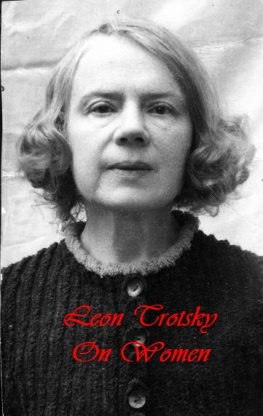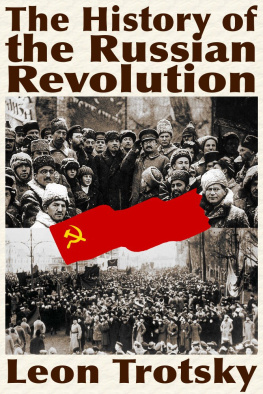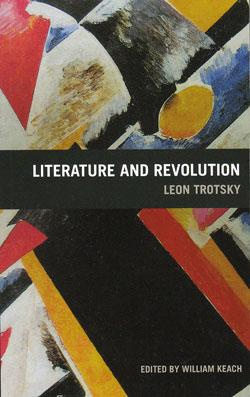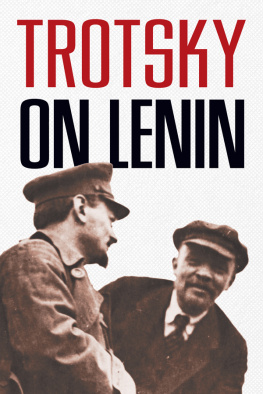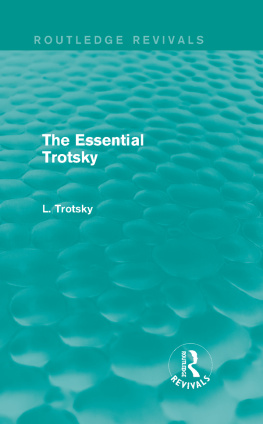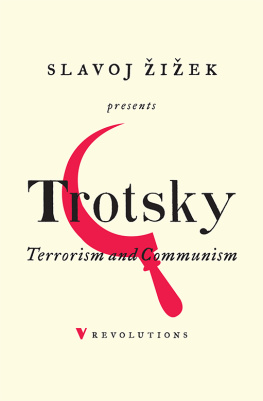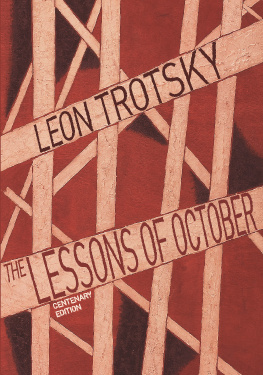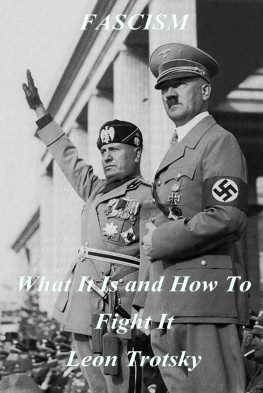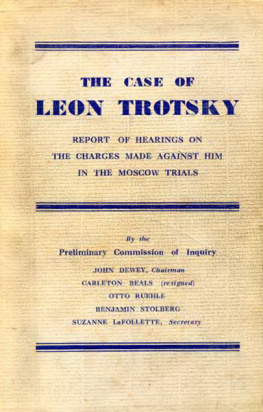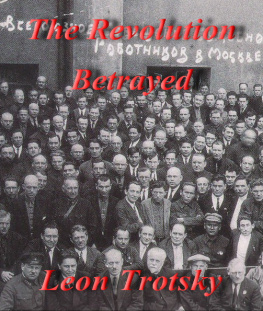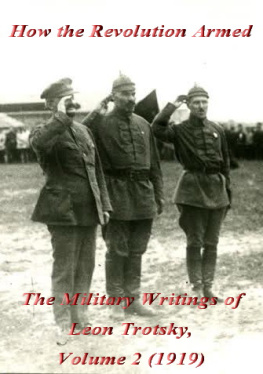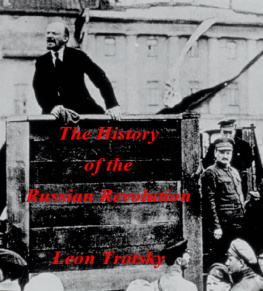Leon Trotsky - Trotsky on Women
Here you can read online Leon Trotsky - Trotsky on Women full text of the book (entire story) in english for free. Download pdf and epub, get meaning, cover and reviews about this ebook. publisher: Marxists Internet Archive, genre: Politics. Description of the work, (preface) as well as reviews are available. Best literature library LitArk.com created for fans of good reading and offers a wide selection of genres:
Romance novel
Science fiction
Adventure
Detective
Science
History
Home and family
Prose
Art
Politics
Computer
Non-fiction
Religion
Business
Children
Humor
Choose a favorite category and find really read worthwhile books. Enjoy immersion in the world of imagination, feel the emotions of the characters or learn something new for yourself, make an fascinating discovery.
- Book:Trotsky on Women
- Author:
- Publisher:Marxists Internet Archive
- Genre:
- Rating:4 / 5
- Favourites:Add to favourites
- Your mark:
- 80
- 1
- 2
- 3
- 4
- 5
Trotsky on Women: summary, description and annotation
We offer to read an annotation, description, summary or preface (depends on what the author of the book "Trotsky on Women" wrote himself). If you haven't found the necessary information about the book — write in the comments, we will try to find it.
Trotsky on Women — read online for free the complete book (whole text) full work
Below is the text of the book, divided by pages. System saving the place of the last page read, allows you to conveniently read the book "Trotsky on Women" online for free, without having to search again every time where you left off. Put a bookmark, and you can go to the page where you finished reading at any time.
Font size:
Interval:
Bookmark:
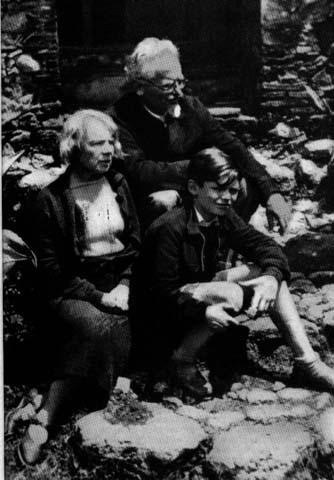
Trotsky took up womens and many other social and cultural issues. He had a repeated theme of equality for the sexes in domestic life before there could be equality for political or economic opportunity.
From Pravda
Transcribed and HTML Markup: Sally Ryan.
Family Relations Under The Soviets.
Written: 1932. First Published: 1934.
Source:Class Struggle Official Organ Of The Communist League Of Struggle (Adhering to the International Left Opposition), Vol. 4 No. 67, JuneJuly 1934.
Online Version: Vera Buch & Albert Weisbord Internet Archive. Transcribed/HTML Markup: Albert Weisbord Internet Archive/David Walters.
Thermidor in the Family.
Written: 1936. First published: 1937.
Translated: Max Eastman. Transcribed for the Internet: Zodiac between August 1993 and March 1996.
eBook format: Kollektiv Yakov Perelman, from the version available at Trotsky Internet Archive in October 2015.
During the many discussions on the question of our state machinery, Comrade Kiselev, the president of the Subsidiary Council of Peoples Commissars, brought forward, or at least recalled to mind, one side of the question that is of vast importance. In what manner does the machinery of the state come in direct contact with the population? How does it deal with the population? How does it treat a caller, a person with a grievance, the petitioner of old? How does it regard the individual? How does it address him, if it addresses him at all? This, too, is an important component part of life.
In this matter, however, we must discriminate between two aspects form and substance.
In all civilized democratic countries the bureaucracy, of course, serves the people. This does not prevent it from raising itself above the people as a closely united professional caste. If it actually serves the capitalist magnates, that is, cringes before them, it treats the workman and peasant arrogantly, whether it be in France, Switzerland, or America. But in the civilized democracies the fact is clothed in certain forms of civility and politeness, in greater or lesser degree in the different countries. But when necessary (and such occasions occur daily) the cloak of civility is easily thrust aside by the policemans fist; strikers are beaten in police stations in Paris, New York, and other centers of the world. In the main, however, democratic civility in the relations of the bureaucracy with the population is a product and a heritage of bourgeois revolutions. The exploitation of man by man has remained, but the form of it is different, less brutal, adorned with the cloak of equality and polished politeness.
Our Soviet bureaucratic machine is unique, complex, containing as it does the traditions of different epochs together with the germs of future relationships. With us, civility, as a general rule, does not exist. But of rudeness, inherited from the past, we have as much as you please But our rudeness itself is not homogeneous. There is the simple rudeness of peasant origin, which is unattractive, certainly, but not degrading. It becomes unbearable and objectively reactionary only when our young novelists boast of it as of some extremely artistic acquisition. The foremost elements of the workers regard such false simplicity with instinctive hostility, for they justly see in the coarseness of speech and conduct a mark of the old slavery, and aspire to acquire a cultured speech with its inner discipline. But this is beside the point ...
Side by side with this simple kind, the habitual passive rudeness of the peasant, we have another, a special kind the revolutionary-a rudeness of the leaders, due to impatience, to an over-ardent desire to better things, to the irritation caused by our indifference, to a creditable nervous tension. This rudeness, too, if taken by itself, is, of course, not attractive, and we dissociate ourselves from it; but at bottom, it is often nourished at the same revolutionary moral fount, which, on more than one occasion in these years, has been able to move mountains. In this case what must be changed is not the substance, which is on the whole healthy, creative, and progressive, but the distorted form ...
We still have, however and herein is the chief stumbling block the rudeness of the old aristocracy, with the touch of feudalism about it. This kind is vile and vicious throughout It is still with us, uneradicated, and is not easy to eradicate.
In the Moscow departments, especially in the more important of them, this aristocratic rudeness is not manifested in the aggressive form of shouting and shaking a fist at a petitioners nose; it is more often shown in a heartless formality. Of course, the latter is not the only cause of red tape; a very vital one is the complete indifference to the living human being and his living work. If we could take an impression on a sensitive plate of the manners, replies, explanations, orders, and signatures of all the cells of the bureaucratic organism, be it only in Moscow for a single day, the result obtained would be one of extraordinary confusion. And it is worse in the provinces, particularly along the borderline where town and country meet, the borderline that is most vital of all.
Red tape is a complex, by no means homogeneous phenomenon; it is rather a conglomeration of phenomena and processes of different historical origins. The principles that maintain and nourish red tape are also varied. Foremost among them is the condition of our culture the backwardness and illiteracy of a large proportion of our population. The general muddle resulting from a state machinery in continuous process of re construction, inevitable during a period of revolution, is in itself the cause of much superfluous friction, which plays an important part in the manufacture of red tape. It is the heterogeneity of class in the Soviet machine the admixture of aristocratic, bourgeois, and Soviet tradition that is responsible for the more repulsive of its forms.
Consequently the struggle against red tape cannot but have a diversified character. At bottom there is the struggle against the low conditions of culture, illiteracy, dirt, and poverty. The technical improvement of the machine, the decrease of staffs, the introduction of greater order, thoroughness, and accuracy in the work, and other measures of a similar nature, do not, of course, exhaust the historic problem, but they help to weaken the more negative sides of red tape. Great importance is attached to the education of a new type of Soviet bureaucrat the new spets [specialists]. But in this also we must not deceive ourselves. The difficulties of educating thousands of new workers in the new ways, ie, in the spirit of service, simplicity, and humanity, under transitional conditions and with preceptors inherited from the past, are great. They are great, but not insuperable. They cannot be overcome at once, but only gradually, by the appearance of a more and more improved edition of Soviet youth.
Font size:
Interval:
Bookmark:
Similar books «Trotsky on Women»
Look at similar books to Trotsky on Women. We have selected literature similar in name and meaning in the hope of providing readers with more options to find new, interesting, not yet read works.
Discussion, reviews of the book Trotsky on Women and just readers' own opinions. Leave your comments, write what you think about the work, its meaning or the main characters. Specify what exactly you liked and what you didn't like, and why you think so.

